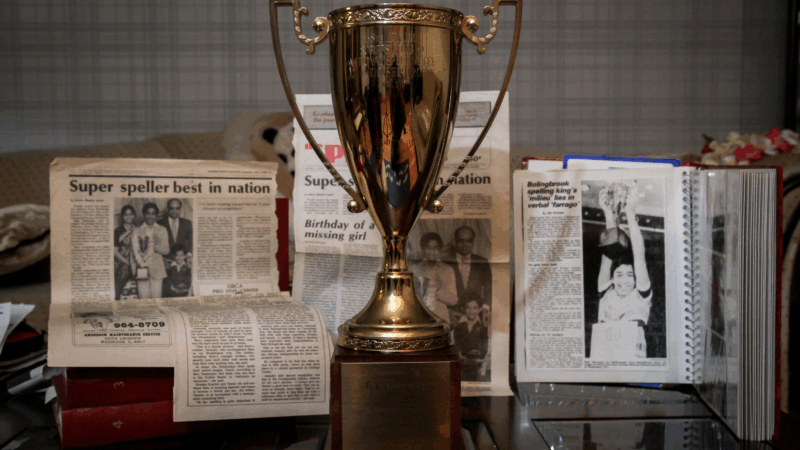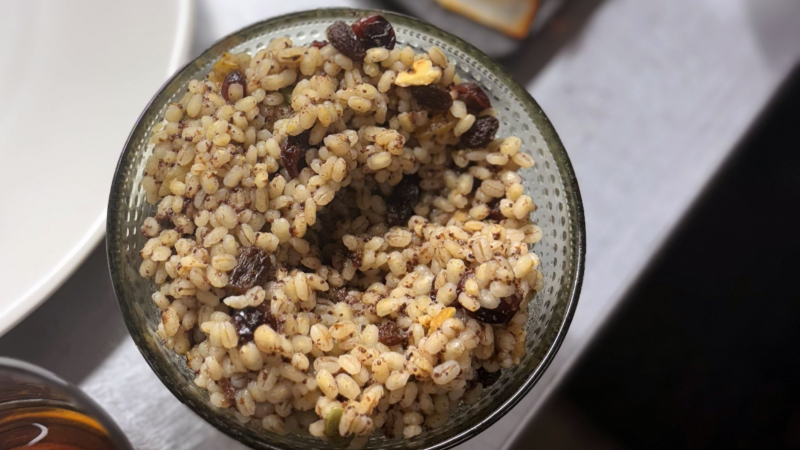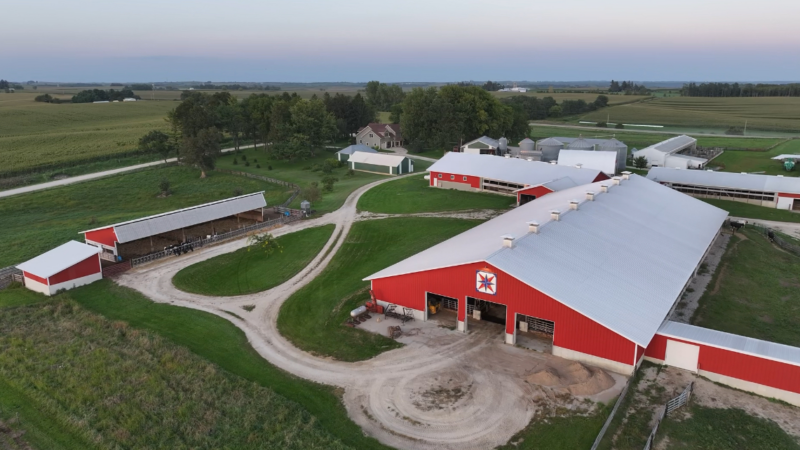As the Scripps spelling bee turns 100, former champions reflect on its evolution
It’s the 100th year of the Scripps National Spelling Bee. From a pool of more than 200 students, nine finalists will take the stage Thursday night.
The bee has evolved immensely over a century, growing more polished, media-savvy and tech forward. The first competition was held in 1925 in Washington, D.C., and only nine kids participated, according to Scripps. Eleven-year-old Frank Neuhauser spelled the winning word: “gladiolus,” the elegant flower frequently spotted in hotel lobbies. He won $500 in gold pieces.
The competition has deepened and the prize has ballooned since then. The champion in Thursday’s bee takes home more than $50,000, as well as a medal, trophy and reference library. As the hopefuls take the stage, several former winners reflected on their victories and how the national bee has evolved, namely becoming more popular (thanks to television) and more competitive (in 2019, eight children tied for first place).
Dan Greenblatt, 1984
“Luge” is a type of small sled in which two people can ride downhill sitting or lying down.
In 1984, it was Dan Greenblatt’s winning word at the national bee, and the shortest winning word ever.
After beating 150 other students, Greenblatt said he was whisked to California to do talk show interviews, which “cured me of my desire to be unreservedly famous. I didn’t want to be a TV star much after that.”
Before the bee, Greenblatt studied by repeatedly going over words with his mom.
“Everything was spell till you drop,” he said.
Now, the competition has become much more intense, Greenblatt said. Spellers have coaches, and there are written and vocabulary tests at the national bee. The eight-way tie winners in 2019 were nicknamed the “octo-champs.”
“They’re going to have to make more changes in the future to kind of stay one step ahead of the game in that regard,” he said. “I think that broke a lot of brains.”
Greenblatt doesn’t do much spelling these days, at least not with the rigor of the Scripps bee. He has judged some local bees, but has spent his career as a software engineer. For a long time, he said he shied away from telling others about his championship status, as it would often overtake conversations.
But ultimately, he said winning the bee helped him get over his fear of public speaking, made him comfortable on camera and gifted him with fearlessness.
“Everybody fails at something, at least once in a while in their lives. And it’s nothing to be ashamed of. You learn from your mistakes and you go on. I think that’s a good thing for kids to experience,” he said.
Balu Natarajan, 1985

In his three consecutive runs at the Scripps national bee, Balu Natarajan would prepare by combing through a giant dictionary with his parents, writing the words on index cards and using them as flashcards.
In 1985, he became the first Indian American to win the Scripps bee by correctly spelling “milieu,” which refers to someone’s social background.
“There was a lot of intrigue about an immigrant son winning the national spelling bee, and it really validated for me quite a bit the fact that persevering mattered,” he said.
Now, Natarajan’s sons compete in the national bee.
Natarajan, a physician, said when he was growing up, the home computer wasn’t used as a study tool. But now his sons are able to learn about five times the number of words he did using the tech.
“I think it’s remarkable what these kids do,” Natarajan said. “They really put forth this incredible effort, and being able to prepare for this, it is really like a marathon or an Olympic sport.”
Kerry Close Guaragno, 2006
Kerry Close Guaragno’s winning word was “ursprache,” a German word meaning a parent language.
She competed four times before reaching first place, and that experience has come in handy for her job in public relations.
“Being a strong writer, being good with language is a big part of my job,” she said. “But also, I would say the fact that the bee taught me poise under pressure, how to think on your feet and think strategically definitely comes in handy.”
They are lessons today’s contestants will need, as the variety of words used in the bee continues to climb. Students are now being asked to spell phrases, genuses, medical drugs and more.
But like Natarajan, one of Close Guaragno’s most important takeaways from her time at the bee is to keep going.
And to all the other Scripps competitors, she says, “You made it here, that’s the big achievement. You made it to the national championship, and not every kid gets to do that. Be proud of that accomplishment.”
Out with the mayo: How Ukrainians reclaim holiday food
For many people from former Soviet countries, New Year's is a big holiday feast time. A Ukrainian restaurant in Washington gives NPR a taste of what's on the menu.
His brother’s mental illness isolated his family. Now he’s helping other caregivers
When it comes to serious mental illness, family caregivers are crucial partners. But often, they must fend for themselves. A new solution offers them support.
Farmers are about to pay a lot more for health insurance
Tariffs, inflation, and other federal policies have battered U.S. farmers' bottom lines. Now many farmers say the expiration of federal health care subsidies will make their coverage unaffordable.
50 wonderful things from 2025
Each year, critic Linda Holmes looks back on the year and compiles a list of the things that brought her joy.
Why do we make New Year’s resolutions? A brief history of a long tradition
One of the earliest mentions of New Year's resolutions appeared in a Boston newspaper in 1813. But the practice itself can be traced back to the Babylonians.
Judge orders new trial for Alabama woman sentenced to 18 years in prison after stillbirth
Lee County Circuit Judge Jeffrey Tickal vacated Brooke Shoemaker’s 2020 conviction for chemical endangerment of a child resulting in death. Tickal said Shoemaker's attorneys presented credible new evidence that the infection caused the stillbirth.








